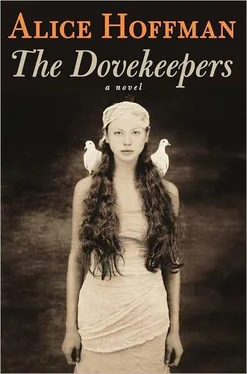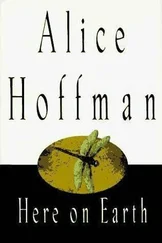Alice Hoffman - The Dovekeepers
Здесь есть возможность читать онлайн «Alice Hoffman - The Dovekeepers» весь текст электронной книги совершенно бесплатно (целиком полную версию без сокращений). В некоторых случаях можно слушать аудио, скачать через торрент в формате fb2 и присутствует краткое содержание. Год выпуска: 2011, ISBN: 2011, Жанр: Историческая проза, на английском языке. Описание произведения, (предисловие) а так же отзывы посетителей доступны на портале библиотеки ЛибКат.
- Название:The Dovekeepers
- Автор:
- Жанр:
- Год:2011
- ISBN:978-1-4516-1749-8
- Рейтинг книги:2.5 / 5. Голосов: 2
-
Избранное:Добавить в избранное
- Отзывы:
-
Ваша оценка:
- 60
- 1
- 2
- 3
- 4
- 5
The Dovekeepers: краткое содержание, описание и аннотация
Предлагаем к чтению аннотацию, описание, краткое содержание или предисловие (зависит от того, что написал сам автор книги «The Dovekeepers»). Если вы не нашли необходимую информацию о книге — напишите в комментариях, мы постараемся отыскать её.
The Dovekeepers — читать онлайн бесплатно полную книгу (весь текст) целиком
Ниже представлен текст книги, разбитый по страницам. Система сохранения места последней прочитанной страницы, позволяет с удобством читать онлайн бесплатно книгу «The Dovekeepers», без необходимости каждый раз заново искать на чём Вы остановились. Поставьте закладку, и сможете в любой момент перейти на страницу, на которой закончили чтение.
Интервал:
Закладка:
That was what my mother meant when she told me love would be my undoing. Love made you give yourself away, it bound you to this world, and to another’s fate. I lay down beside Eleazar. We were together as we had been even when we were apart, for we were one person, wed by more than our desire.
We had our last moments of life in this world, but I would have died a hundred times to have had his love. I kissed him in a way I would never kiss another. His spirit entwined with mine as he entered me and took me to be his. If I wept, it was only because water was my element, what I yearned for and needed most of all. When he was done, I still wept to give him up, although it had been written that I must. I loved him even now, as he took a knife to my throat, as I drowned in blood, as I whispered, Cousin, you were wrong. We were born to live.
Nissan the 15th, 73 C.E.
Alexandria 77 C.E
They call me the Witch of Moab.
So it was written in the Book of Life. Before I was born of a woman who was already dead, before I left Jerusalem and was bitten by a lion, before the Romans came to destroy us, it had already been determined that this would come to be.
Once I was certain I would never again know the pleasure of the simplest things: a loom, a table, a comb for my hair. I thought my life was over and the angel with a thousand eyes was at my door. But I was wrong. I have a house made of white stones. Workmen labored to build the fountain in the center of the courtyard deep within a walled garden where there are date palm trees and pots of jasmine and the white lilies that can be found in no other land, except, perhaps, in the fields of the world beyond our own.
When Mal’ach ha-Mavet came for me, flecked with the blood of my people, I was wearing the cloak of invisibility. I had journeyed so far down into the earth he would have had to have taken a hundred steps before he could spy me, though he possessed the vision of an army. Despite his gift of sight, I still would have been hidden from view, for it is said that Death must close his eyes when he enters into water, and I was submerged in a cistern, a well so deep there are those who believe that it has no bottom, that it reaches to the center of the earth, back to the foundation stone in Jerusalem, where creation began.
It was water that saved us, protecting us from the flames that flickered and from Death’s grasping hands. We had hurried down the stone steps, breathless in the dark, as Death surged above us, before we slipped into the water, as though we were fish, for our people are sister and brother to such creatures, and that is why we can endure where others are doomed to perish.
In Alexandria, the mornings are pale, the air so damp it seems a world of water until the sun breaks through in yellow bands of light. I can see the harbor as I prepare cups of black tea, sesame candies, sweet oranges cut in quarters. There are three black goats in the barn, a dozen sheep behind the fence, a white donkey who is so swift he raises clouds of red dust when he runs. There have been disruptions in this city for our people, but we have managed to remain.
Arieh and Yonah play in the garden after their lessons, hiding in the reeds beside a pond where herons come to feed. There is a white ibis who has laid claim to our fountain. She stands on one slim leg and drinks water, lifting her head to the heavens. Perhaps the one we left behind has come to us in the guise of this creature, for she observes us carefully, and with compassion.
Revka’s grandsons are no longer children but men whose shadows are so tall I am startled they belong to those who were once the boys to whom I told stories so they might sleep through the night. Now it is Revka and I who toss and turn as we dream of men who refused to surrender and women who were ruled by devotion. We remember everything they were fighting for and everyone they loved and were loyal to. We remember the way the world looked when it was ruled by war.
In the evening when the sky is struck with gauzy vermilion light, in the hour when the space between worlds opens before the inky blue night sifts down to earth, women come to the back gate to ask for the Witch of Moab. They wear their finest clothes, leather sandals that hush their steps, gold signet rings and bracelets adorning their slim fingers and wrists, black kohl rimming their eyes. They offer me gold and silver coins, strands of pearls. In return they ask that I throw the bones of birds to divine their futures. They ask for marjoram and rue, for amulets and potions, for good health, for children to be born and enemies to vanish. Always, they ask for love. I open the book where these recipes are written, the ink still fresh even though the parchment has turned brown, as if I held a sheaf of leaves in my hands.
The women who arrive call me clever, cunning, beautiful, wise. They tell me their secrets and speak of violations and of dreams. They confide what they would never admit to another even though I am a stranger. I do the best I can on their behalf. I have learned divination from a wise woman, but I learned how to listen from a ghost.
I often take the winding cobbled road to the harbor to watch the great lantern that is lit there in the evenings in the lighthouse on the island of Pharos, one of the seven wonders of the world. I look for the ships that come from Greece, blowing across the sea, their huge white sails filling with wind from the four corners of the earth. Water surrounds us. When the Nile overflows, the fields turn green and there are great celebrations, lanterns strung from trees, drumming all night long, dancers in veils and long skirts. The river runs every shade of blue that has ever been known to humankind: ink and turquoise and lapis, indigo, teal, cerulean, and ultramarine. Yet what I long for most is the desert. Ivory, alabaster, the rocks that caused my feet to bleed, the knife to mark off days, the man I loved. In the evenings the scent of that arid land comes across from Judea and reminds me of who I used to be. My hair is perfumed and braided, but at night I remove the pins and let it fall loose down my back.
When I sit in the darkness, the birds come to me. They still know me for who I am.
I am the girl in the desert, even though I am so far away.
I am the woman who was saved by doves, for when I saw them rise up in a cloud above Masada at the hour when darkness reigned, I knew that we must escape.
We were in the kitchen of the palace, waiting for Mal’ach ha-Mavet to walk through the door in the form of one of the ten death-givers who would come to us to slit our throats. Revka and the children were huddled together, listless, as dumbfounded as the sheep who edge toward the butcher when called and herded by bells. I paced the black and white mosaic floor, then went to the door, eagerly scanning the crowd. I was hopeful that Shirah would soon appear, returning to us with Aziza and Adir safely retrieved from the mayhem. But the more I watched the more I trembled, for bodies were piled up in the plaza and the blood was like a river, a tide that fed the olive trees and the date palms and the garden that had turned to ash. There was incessant wailing, but soon the echoing cries gave way to an uncanny silence. Shirah had once told me that silence was the only thing we had to fear. It was our true enemy, signifying that, like the footprints that were swept away in a storm, we had disappeared from God’s sight.
Yonah cried suddenly, breaking the silence with the sweet voice of one who demands to be fed. I still nursed Arieh, and when the newborn cried, I felt my milk come in. In that instant I knew that, despite the death that encircled us, I was still alive.
Читать дальшеИнтервал:
Закладка:
Похожие книги на «The Dovekeepers»
Представляем Вашему вниманию похожие книги на «The Dovekeepers» списком для выбора. Мы отобрали схожую по названию и смыслу литературу в надежде предоставить читателям больше вариантов отыскать новые, интересные, ещё непрочитанные произведения.
Обсуждение, отзывы о книге «The Dovekeepers» и просто собственные мнения читателей. Оставьте ваши комментарии, напишите, что Вы думаете о произведении, его смысле или главных героях. Укажите что конкретно понравилось, а что нет, и почему Вы так считаете.












